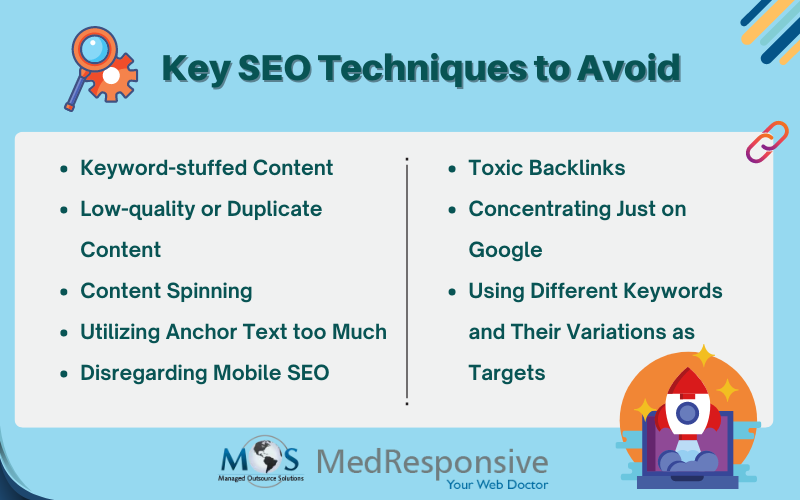Today’s businesses, particularly those in the E-Commerce sector, rely significantly on organic search traffic to grow their client base and revenue. Since the first page of search results receives an astounding 71% of all link clinks, performing well in SEO (search engine optimization) will usually get you a spot on the first page of search results. Many years ago, SEO was very different from what it is today. It was a common misconception that SEO was a deceptive marketing strategy meant to trick Google into ranking a website higher up in the search results. This gave rise to black hat SEO, and the internet became a minefield of deceptive tactics, making it impossible for anybody using white hat SEO to win. However, Google’s capacity to identify these illegal SEO tactics was still lacking at this point. As a result, search engines have developed a set of criteria that they deem unethical and particularly attempt to spot black hat SEO. This is important to stay away from black hat techniques. A reliable organic SEO service has the expertise to discard any black hat techniques and implement a strong SEO optimization strategy.
Reasons to Avoid Black Hat SEO Practices
Search engine algorithms are manipulated by unethical SEO techniques. If you attempt to take advantage of search engine algorithmic flaws, it will probably be detected. Unethical SEO is increasingly simpler to detect as search engines get better, and the consequences of getting found are frequently not worth the risk. Here are some of the reasons why you must avoid poor SEO practices.
- Affects your search ranking: First, a decline in your search ranking could be the worst-case scenario of engaging in black hat SEO. A domain may be completely removed from Google’s listings or just one URL may be penalized. You should steer clear of the following typical categories of Google penalties:
- Keyword-level
- URL or directory level
- Hostname level (subdomain)
- Domain-wide (entire domain name)
- Delisting (aka deleting your site)
Penalties can be scary. It is literally within Google’s power to remove your page, even if you are the owner. Decreased traffic and visibility might result in lost sales, job losses, or the liquidation of your business, depending on the size of your blog.
- Focus Only on Short-term Outcomes: You might have a brief period of success after using black hat SEO. However, until Google finds the unethical practices—either through a manual review or a core algorithm update—those results are just temporary. In any case, traffic will inevitably decline. Black hat SEO is unable to provide the consistent traffic patterns that businesses want.
- Leads to poor user experiences: A poor user experience reduces the authority of the site. If people consistently have a bad experience using your website, this will negatively affect how visitors see your brand. Adding black hat SEO to the mix is quite risky because that alone has the potential to degrade your search rankings.
Poor SEO Practices to Avoid
- Keyword-stuffed content: Search engines rank pages based on keywords but overuse of keywords in the content is an outdated technique. Repetition of short keywords or long-tail keywords can clutter your page and search engines may penalize over-optimized content. Similarly, over-optimizing Meta description too is not a contributing factor for better search engine ranking. Google lists the following as examples of keyword stuffing.
- Blocks of text listing the cities and states a web page is trying to rank for
- Lists of phone numbers without substantial added value
- Repeating the same words and phrases again and again so that it sounds unnatural. For example, “We sell custom cigar humidors. Our custom cigar humidors are handmade. If you’re thinking of buying a custom cigar humidor, please contact our custom cigar humidor specialists at cigar.humidors@example.com.”
- Low Quality or duplicate content: Making poor content in an attempt to cut costs or save time will probably have the opposite effect. It may result in low conversion rates, bad search engine results, and damage to your brand’s reputation. Make sure to write for people and not search engines. A content piece could be of poor quality if
- It is not original
- Doesn’t address the search query that brought the user to your page—that is, the query they entered into Google
- Does not provide facts or reference to support statements
- Contains a number of typos or grammar mistakes
- Not very readable
- Lacking E-E-A-T
- Content Spinning: “Spinning” content is an unacceptable SEO strategy. To avoid outright plagiarism, it entails taking concepts and organizational frameworks from other websites and then rewording some of the text. This may even entail content modification through artificial intelligence. This is plagiarism even if you change the structure of every sentence and paragraph. This technique was once employed by unethical website operators to produce a large amount of content rapidly. Additionally, some have claimed that material spinning isn’t “technically” plagiarism. Google and other search engines, however, forbid using duplicate or copied information. Additionally, they’ve improved greatly at spotting it and punishing your website. You can still produce novel content without plagiarizing, though. To make sure that your content is unique, it is best to develop your brand voice and use it in them. To add personality to your postings, you may also think about incorporating unique and real-life examples in them.
- Utilizing Anchor Text Too Much: A word or phrase that links to other content is known as anchor text. Anchor text with appropriate keyword variations and use is generally what you should aim for when creating your internal linking strategy. It could be tempting to limit your content’s links to specific keywords. But this is an out-of-date SEO strategy. Google’s Penguin update has made it easier for the search engine to recognize “over-optimized content” and irrelevant backlinks. you risk fines if you include links to irrelevant content in your articles. Try to write your material with your audience in mind instead. Feel free to add a relevant link to natural anchor text if you are able to. Overcrowding your post with URLs and keywords can make it difficult for readers to read and less useful for search engines.
- Disregarding Mobile SEO: Every year, more and more people use mobile search. Actually, mobile devices account for more than half of all searches. Furthermore, some websites receive even more visits from mobile devices. As a result, concentrating only on desktop optimization techniques is a poor SEO strategy. It may degrade your SERP ranks and offer a subpar mobile user experience, which may drive away potential customers. Consider using a tool like PageSpeed Insights to assess how well your website functions on mobile devices. This tool can provide you with recommendations for optimizing your website for mobile devices.
- Toxic backlinks: Backlinks that negatively impact your website’s search engine ranking are known as toxic backlinks. Most often, “link spam,” as Google refers to the practice, is used to obtain these potentially dangerous backlinks. The following instances are provided by Google in its recommendations about link spam:
- Purchasing or selling of links
- Link exchanges for cash, products, services, or samples
- Overuse of link exchanges (“Link to me and I’ll link to you”)
- Partner sites just for the purpose of linking
- Making links to your website with automated tools or services
- Getting a link as part of a contract
- Paid advertisements with optimized links
- Concentrating Just on Google: We all know that when it comes to optimization, Google has historically received the majority of attention. This strategy may make some sense given that it is the most widely used search engine. But if you cut yourself off from other platforms, you can lose out on a lot of traffic. A chance is also lost if social media is neglected. SEO is heavily reliant on social media. According to industry experts, your website will rank higher on search engines the more social media shares it receives.
- Using Different Keywords and Their Variations as Targets: It could be tempting to write a piece that targets several keywords and their synonyms. You may even believe that using this strategy will help your articles rank highly everywhere. But this is a poor SEO method that is also out of date. One reason is that attempting to rank for several keywords frequently results in lower-quality content. Your text may start to sound forced to readers if you stuff too many important phrases into it. Additionally, you lessen the article’s value to your audience. When an article tries to cover two topics, even related ones, it loses its focus and becomes less useful than it may have been. Moreover, search engines are not too bad at recognizing synonyms for keywords. In general, we advise focusing on one specific keyword on each page and post. Write a new article if you want to explore a slightly different topic. This doesn’t mean you shouldn’t focus on long-tail keywords and write on other subjects; just make sure they have a direct connection for the article’s purpose.
Similarly, duplicate content can also be dangerous. Pages created with the same material are referred to as duplicate content. Or almost the same, with an occasional word substituted. It is possible to encounter duplicate stuff without realizing it.
Read our blog post to know the Common Technical SEO Mistakes and How to Fix Them
With more and more people on the internet every day, it is vital for any medical business to stay ahead of the curve with a strong online presence. It is important to use the right medical SEO techniques, ideally with the support of digital marketing services, for better page ranking and visibility.





